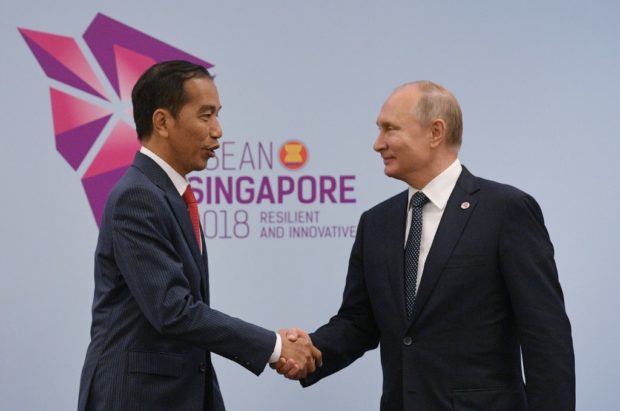
Russian President Vladimir Putin (R) and Indonesia’s President Joko Widodo. Photo by Alexey DRUZHININ / SPUTNIK / AFP
JAKARTA — Indonesia and Russia are inching closer to actualizing cooperation on COVID-19 crisis management as the two have expressed a commitment to ink a collaboration on COVID-19 information sharing, knowledge exchange, vaccine development and early detection of communicable diseases.
The two countries discussed the details of the cooperation during a virtual bilateral meeting involving their respective delegations on Friday, according to a statement from the Indonesian Foreign Ministry.
The meeting – which brought together health ministries and foreign ministries from each country – was a follow up of the previous call conducted by Indonesian President Joko “Jokowi” Widodo and Russian President Vladimir Putin on April 13, which mostly discussed COVID-19 handling.
During the meeting, the Indonesian delegation emphasized the importance for Jakarta and Moscow to embark on broader cooperation in the healthcare sector, especially in the time of the pandemic. Such cooperation is also a manifestation of the decades of diplomatic ties, which enter their 70th commemoration this year, the ministry said.
Meanwhile, the Russian delegation said it was currently developing COVID-19 vaccines, some of which had been clinically tested. If they were proven to be effective for COVID-19 and received the green light from the Russian government, the vaccines are supposed to be available by the end of this year.
“The Russian delegation welcomed the proposal from Indonesia regarding cooperation on vaccine development and communicable diseases’ research and early detection. They also conveyed their interest to study Indonesia’s COVID-19 quarantine mechanism and health protocol,” the statement read.
As of Monday, Russia has recorded more than 468,000 cases of COVID-19, over 227,000 recoveries and more than 5,800 fatalities.
Indonesia has reported at least 31,186 COVID-19 infections, with 1,851 cases that have turned fatal. More than 10,400 patients have recovered, according to the government’s official count on Sunday.
Jakarta and Moscow have agreed to accelerate the drafting of the memorandum of understanding of the bilateral healthcare cooperation as well as the Joint Plan of Action on healthcare cooperation between the two countries – as one of the priorities of planned concrete cooperation this year.